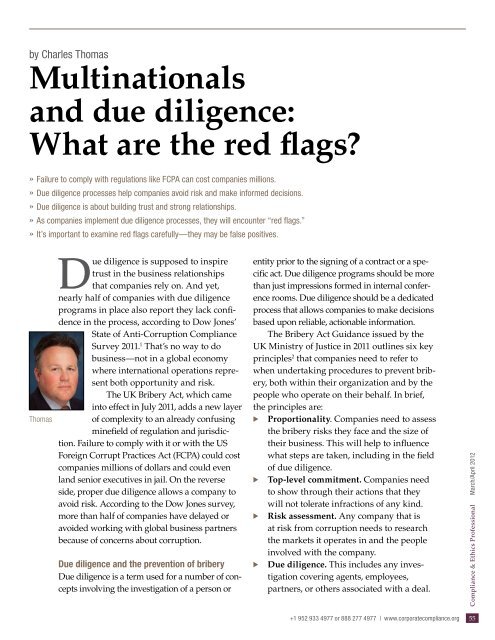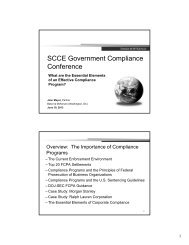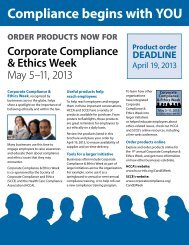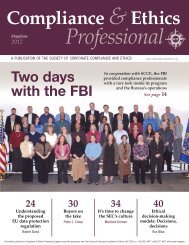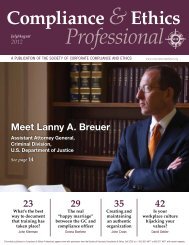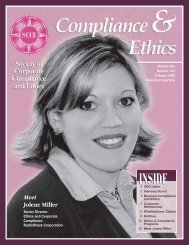Compliance & Ethics Professional - Society of Corporate ...
Compliance & Ethics Professional - Society of Corporate ...
Compliance & Ethics Professional - Society of Corporate ...
- No tags were found...
You also want an ePaper? Increase the reach of your titles
YUMPU automatically turns print PDFs into web optimized ePapers that Google loves.
y Charles ThomasMultinationalsand due diligence:What are the red flags?»»Failure to comply with regulations like FCPA can cost companies millions.»»Due diligence processes help companies avoid risk and make informed decisions.»»Due diligence is about building trust and strong relationships.»»As companies implement due diligence processes, they will encounter “red flags.”»»It’s important to examine red flags carefully—they may be false positives.ThomasDue diligence is supposed to inspiretrust in the business relationshipsthat companies rely on. And yet,nearly half <strong>of</strong> companies with due diligenceprograms in place also report they lack confidencein the process, according to Dow Jones’State <strong>of</strong> Anti-Corruption <strong>Compliance</strong>Survey 2011. 1 That’s no way to dobusiness—not in a global economywhere international operations representboth opportunity and risk.The UK Bribery Act, which cameinto effect in July 2011, adds a new layer<strong>of</strong> complexity to an already confusingminefield <strong>of</strong> regulation and jurisdiction.Failure to comply with it or with the USForeign Corrupt Practices Act (FCPA) could costcompanies millions <strong>of</strong> dollars and could evenland senior executives in jail. On the reverseside, proper due diligence allows a company toavoid risk. According to the Dow Jones survey,more than half <strong>of</strong> companies have delayed oravoided working with global business partnersbecause <strong>of</strong> concerns about corruption.Due diligence and the prevention <strong>of</strong> briberyDue diligence is a term used for a number <strong>of</strong> conceptsinvolving the investigation <strong>of</strong> a person orentity prior to the signing <strong>of</strong> a contract or a specificact. Due diligence programs should be morethan just impressions formed in internal conferencerooms. Due diligence should be a dedicatedprocess that allows companies to make decisionsbased upon reliable, actionable information.The Bribery Act Guidance issued by theUK Ministry <strong>of</strong> Justice in 2011 outlines six keyprinciples 2 that companies need to refer towhen undertaking procedures to prevent bribery,both within their organization and by thepeople who operate on their behalf. In brief,the principles are:··Proportionality. Companies need to assessthe bribery risks they face and the size <strong>of</strong>their business. This will help to influencewhat steps are taken, including in the field<strong>of</strong> due diligence.··Top-level commitment. Companies needto show through their actions that theywill not tolerate infractions <strong>of</strong> any kind.··Risk assessment. Any company that isat risk from corruption needs to researchthe markets it operates in and the peopleinvolved with the company.··Due diligence. This includes any investigationcovering agents, employees,partners, or others associated with a deal.<strong>Compliance</strong> & <strong>Ethics</strong> <strong>Pr<strong>of</strong>essional</strong> March/April 2012+1 952 933 4977 or 888 277 4977 | www.corporatecompliance.org 55


